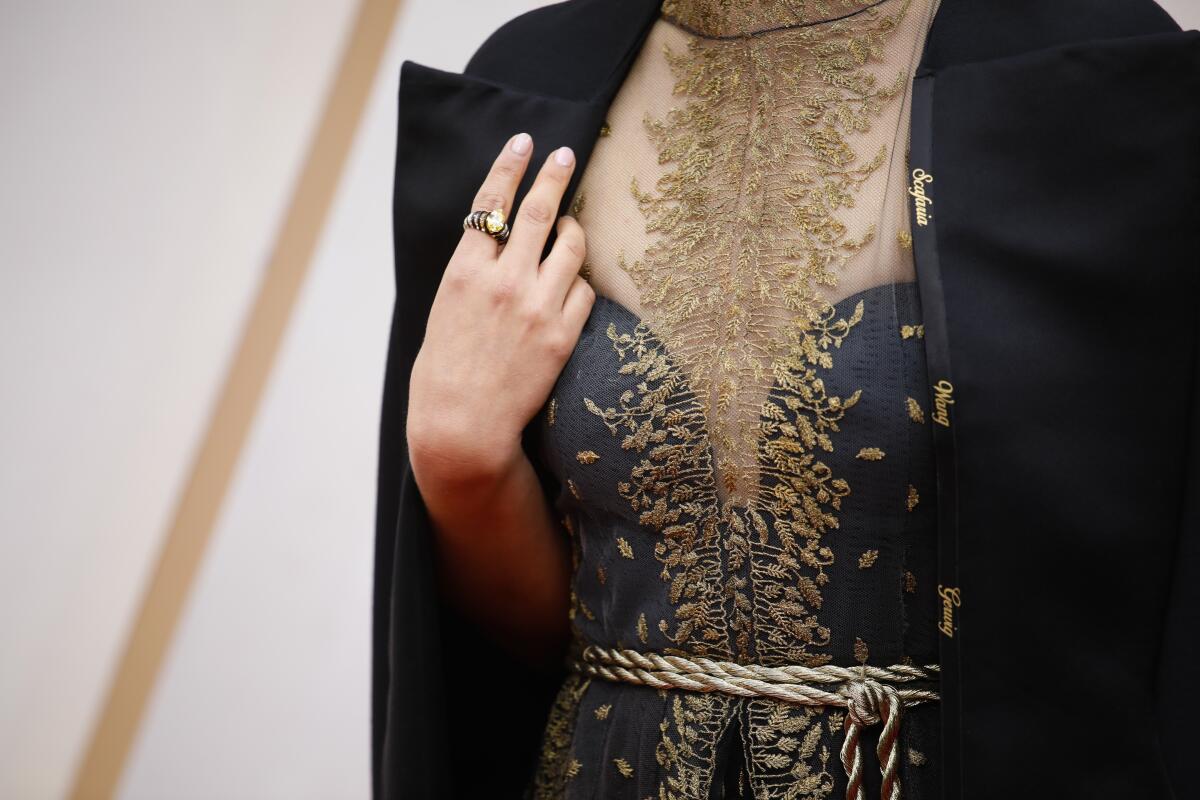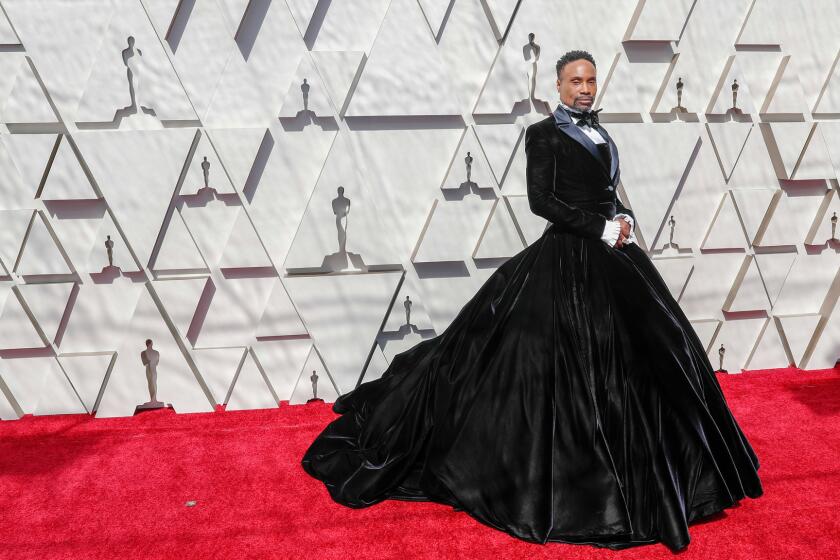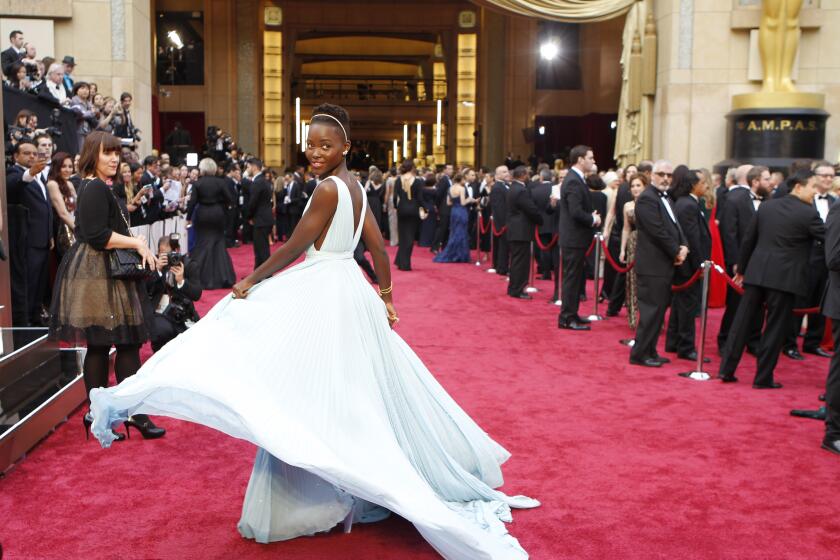Column: My Oscar prediction: Celebrities, and their fashions, will meet the political moment

- Share via
We interrupt the news about Russia’s war on Ukraine, North Korea’s frighteningly successful missile test and Republican “jackassery,” as one senator recently and memorably put it, to bring you this important bulletin:
The mother of all awards shows is back!
People, millions of them, will gather in front of their televisions to watch impossibly proportioned, very beautiful people strut for cameras in finery seen only in fashion magazines, on catwalks or on red carpets.
When it comes to the Oscars, I am not especially invested in who wins what, but I do love the spectacle of the voluntarily slimmest people in the world being asked, over and over, “Who are you wearing?” (Frankly, I’d rather know when they last had a cheeseburger.)
Few viewers truly care about which designer created which dress. But that’s not even the point of the question.
The dirty little not-so-secret of awards show fashion is that an actor’s choice of attire is often a quid pro quo with a design house, which can pay a pretty penny for the global exposure.
At the 2015 Vulture Festival in New York, a panel of Hollywood stylists were refreshingly frank about the transactional nature of red-carpet couture.
“Jewelry people are paying, shoe people are paying, tampon companies are paying, everyone is paying!” said celebrity stylist Jessica Paster, who has dressed Cate Blanchett, Emily Blunt, Uma Thurman, Annette Bening and Jennifer Aniston, among many others.
I really hope her reference to feminine hygiene products was hyperbole. I mean, can you imagine best actress nominee Kristen Stewart saying, “Thank you, Tampax, for giving me the courage to wear white tonight.”
Design houses, said Paster, might pay an actress as much as $250,000 to wear a particular dress. “If it looks gorgeous on you and this is the dress we were going to pick anyway,” she asked, “why not be paid?”
In 2017, Chanel designer Karl Lagerfeld accused best actress nominee Meryl Streep of spurning his offer of a custom gown because he didn’t offer to pay her for it. Streep was outraged, accusing Lagerfeld of defaming her. “I do not take this lightly,” she said. Lagerfeld backed down, claiming there had been a misunderstanding.
Despite the eternal — and eternally boring — question about whether the Oscars is an appropriate venue for political messages, it almost always becomes one. And often political messages are incorporated in the couture.
In 2018, following the horrific revelations about indie movie mogul Harvey Weinstein’s years of sexual crimes, many Oscar attendees wore “Times Up” lapel pins, a nod to the #MeToo movement and Hollywood’s well-earned reputation as a cesspool of sexual harassment.
Two years later, Natalie Portman wore a beautiful black cape over a handmade Dior dress, with the names of eight women directors snubbed by the academy that year embroidered in gold along the front edge. “I wanted to recognize the women who were not recognized for their incredible work this year, in my subtle way,” she told the Times’ Amy Kaufman.
Her protest backfired somewhat after Rose McGowan, one of the first actors to accuse Weinstein of rape, objected to the symbolic gesture. “I find Portman’s type of activism deeply offensive to those of us who actually do the work,” McGowan wrote in a Facebook post. “Natalie, you have worked with two female directors in your very long career — one of them was you. You have a production company that has hired exactly one female director — you.”
Portman didn’t exactly apologize but responded, “I have tried, and I will keep trying. While I have not yet been successful, I am hopeful that we are stepping into a new day.”
The only person who turned my head on the red carpet the other night was Billy Porter, the Broadway star whose black velvet tuxedo gown was as beautiful as it was transgressive.
In 2019, Billy Porter upended gender expectations on the red carpet when he wore a perfectly tailored tuxedo jacket over a billowing black velvet skirt. It was an incredibly tasteful way to challenge fashion orthodoxies.
“I have subjugated this instinct in myself for years,” he told me the day after the ceremony. “It’s the very thing I have run from my whole life. When you are Black and gay and you grow up in the church in the African American culture, it’s like your masculinity is in question at every turn. But what does that mean, to be masculine? To be strong and powerful? Women wear pants all the time, and nobody bats an eye, but a man puts on a dress and that’s disgusting?”
I leave Oscar-winner predictions to my supremely qualified movie expert colleagues.
But I can predict with some certainty that political expression will, once again, be in the rarefied Oscar air this year.
We are sure to see and hear protests against Vladimir Putin’s abhorrent attempt to vanquish the people of Ukraine. Blue and yellow lapel pins, anyone? How can anyone with a microphone not take advantage of a global audience to support the besieged democracy?
These L.A. red-carpet looks catapulted careers, kicked off trends, launched memes and more.
Perhaps we will see some olive-green, raglan sleeved T-shirts in honor of the courageous Ukrainian President Volodymyr Zelensky — a former actor, after all — who has rallied his country, and the world, in the face of the Russian onslaught.
And not that you asked, but on Sunday night, I will be sprawled in front of my TV, wearing sweats and a camo-print T-shirt by Kirkland. I swear to you on a stack of my credit card bills, Costco did not pay me to say that!
More to Read
A cure for the common opinion
Get thought-provoking perspectives with our weekly newsletter.
You may occasionally receive promotional content from the Los Angeles Times.














